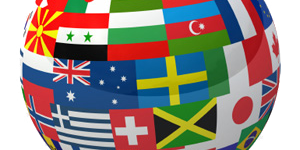Globalization has led to an astronomical increase in the demand for professional translation and interpretation services by companies looking to expand their markets internationally. This has fueled the language service industry that is comprised of translators and interpreters who offer a wide range of services for working content from one language to another. Depending on the nature and offerings of a business, they may require a variety of translation services such as website localization, document translation, on-site interpretation, and more. Among these services, document translation is one of the most sought after needs for globalizing businesses.
A company that provides quality document translation services serve as a bridge to unite businesses with new markets both domestically and abroad. Translators are skilled at a variety of document types such as employee contracts, human resources documents, technical user manuals, legal documents, annual reports, meeting minutes, and even emails and internal memos.
What is the Key to Successful Document Translation?
A successful document translation requires a professional translation services provider who understands the need to keep the context and meaning from the original document in the final translation. The key to translating documents successfully is to convey the exact intended message to the target audience, which may or may not result from literal translation of the source text. Translating documents would be meaningless if the final translations did not servie the purpose of being accurate and clear to the intended reader(s). While some documents such as single page certificates would require simple translation with minimal review, more complex documents such as legal contracts and technical manuals may require high-level translation that can only be achieved by hiring a professional document translation service with a large pool of skilled translators and proofreaders.
What Would Happen Without Proper Document Translation Services?
If a document is translated incorrectly, it can raise serious concerns about a business’ credibility and integrity. Inaccurate translations and can also lead to misunderstandings of important concepts. Poor translation can result in damaged reputations, PR backlash, and lost financial opportunities for businesses. In some cases, faulty translation of legal documents can even result in civil and criminal penalties.
Document Translation Service Best Practices
• Take the Foreign Language’s Principles Into Account – Some expressions or words that are acceptable in certain languages might not be acceptable elsewhere. A skilled translation service provider can work with idioms in one language and convert them to culturally sensitive verbiage in another.
• Understand Specialized Terminology – Each business field has its own specialized terms, concepts and jargons that a professional translator must be able to translate. Skilled technical translators have years of experience in their specialized fields and understand industry jargon at a high level.
• Know the Subject At Hand – A thorough understanding of the document to be translated is necessary to translate correctly. A professional translator will require a legible and complete copy of the original document in its entirety before agreeing to complete any work or provide a timeline for completion.
• Research to Supplement Knowledge – Deep knowledge of specialized research techniques and reference guides will help with unanticipated quandaries. Quality translation services have an extensive network of online and hard copy reference materials to ensure accurate translation.
• Keep the Audience in Mind – Remember who the document is being translated for – the audience’s education, background, and culture all play a role in how information is received. Professional translators will often ask questions to ensure that the translation’s meaning and context is being applied correctly, given the audience.
Visit www.nilservices.com today! Or call 1-877-567-8449 for assistance, 24 hours a day.


